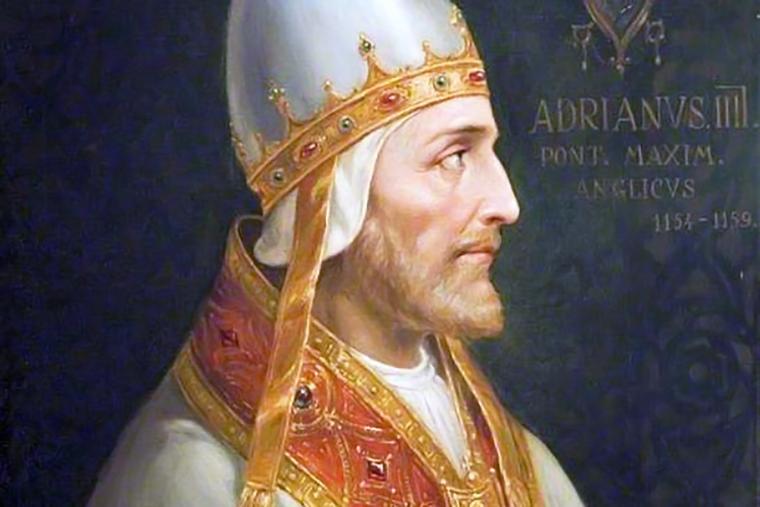Remembering Pope Adrian IV, the Only English Pope in History
Nicholas Breakspear was born in Hertfordshire, England, and died Sept. 1, 1159.

On Sept. 1, 1159, Pope Adrian IV died while staying at the papal residence in Anagni, Italy, near Rome. As a pope, he had a number of accomplishments on his record — including an alliance with the Byzantine Empire and the signing of the Treaty of Benevento, which solidified relations between the papacy of Adrian IV and the Norman kingdom of Sicily.
He is also the only pontiff in history to have been of English descent. While a strong majority of popes (217 of 266) have been Italian, there have been other nationalities represented in the papacy (most recently, Pope Francis from Argentina, Pope Benedict from Germany and Pope John Paul II from Poland). But except for that one instance, no pope has been chosen from among the English clergy.
Pope Adrian (also called Hadrian) — born Nicholas Breakspear — was born in Hertfordshire, England, probably in the town of St. Albans. Little is known about his early life, but as a young man he traveled to Arles, in the south of France, to study law. Rather than pursue a legal career, however, he was attracted to the canons regular at St. Rufus in Avignon. His talent and piety were obvious, and he was named abbot of the order. In that role, he traveled often to Rome, where he appears to have caught the attention of Pope Eugene III, the supreme pontiff at that time.
However, it’s believed that Breakspear was a harsh disciplinarian and that his emphasis on strict obedience was not well received by his monks. Pope Eugene sought to solve two problems: Pacify his monks by removing the English cleric from leadership, and take advantage of Breakspear’s organizational skills by naming him a papal legate. Pope Eugene sent him on a mission to Catalonia, where Christians were attempting to banish the Muslims and reclaim their land. Sometime around 1149, Breakspear was appointed Bishop of Albano, in central Italy. In that role, he was assigned to visit Scandinavia, where he reorganized the Church in Norway, then moved on to Sweden, where he was admired and acclaimed by the local Catholics.
Upon completing his work in Scandinavia, Bishop Breakspear returned to Rome in 1154. The successor to Pope Eugene, Pope Anastasius IV, had just died, and Breakspear was elected to the papacy by his fellow bishops and took the name Adrian IV.
Just a few years later, the Pope’s favoritism toward his native England was revealed in his support for St. Alban’s Abbey (now a Church of England cathedral). He is reported to have issued a papal bull, Laudabiliter, which granted permission to King Henry II to invade Ireland. British historian Richard Cavendish, told the story in History Today:
In 1155 or 1156 an old friend of the Pope’s named John of Salisbury, who was secretary to the Archbishop of Canterbury, Theobald of Bec, arrived in Rome on a mission for his master. Canterbury had lost its former jurisdiction over Irish bishops and it was in Canterbury’s interest to depict the Irish as savages in need of a firm, correcting hand. ‘In response to my petition,’ John later reported, ‘the Pope granted and donated Ireland to the illustrious king of England, Henry, to be held by him and his successors’ and ‘sent the king a gold ring, set with a magnificent emerald, as a sign that he had invested the king with the right to rule Ireland.’
The papal bull describes in detail Pope Adrian’s goals for the assault on Ireland, focusing on the good that might come to the Irish people, but also acknowledging the tax advantage to the Roman Church:
We, therefore, support your pious and praiseworthy intention with the favor that it deserves and, granting our benevolent consent, we consider it pleasing and acceptable that you should enter that island for the purpose of enlarging the boundaries of the Church, checking the descent of wickedness, correcting morals and implanting virtues and encouraging the growth of the faith in Christ; that you pursue policies directed toward the honor of God and the well-being of that land, and that the people of that land receive you honorably and respect you as their lord, all this being on condition that the rights of the Church remain intact and unimpaired, and without prejudice to the payment to St. Peter and the holy Roman Church of an annual tax of one penny from every household.
Pope Adrian IV died Sept. 1, 1159, either from an infection or, as some reports suggest, from choking during a meal.















